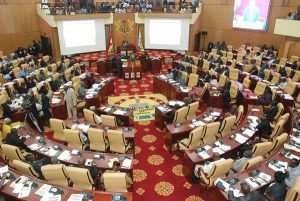
Parliament on Tuesday began discussions for a reduction of the ages allowed by Ghana's 1992 Constitution, to qualify for election as President and Member of Parliament.
This is to enable more young persons to serve Ghana at the nation's highest political offices.
“Mr Speaker, if an individual is old enough to vote and decide on what is the political culture, then the person is old enough to hold that portfolio, “Mr Ernest Henry Norgbey, MP for Ashaiman Constituency said in a statement on the Floor of the House, in Accra.
He continued: “More so, if an individual of 21 is old enough to make laws, then he should be able enough to implement these laws. Why should an immature person make laws for the mature one to obey and implement?”
“Individuals especially the youth are motivated by considerations of self-interest when they get involved in politics. Meaning, if a rational human being has attained the voting age to know who is fit to be in power as stipulated in the Constitution, then the youth must as well be rational enough to contest a position or involve in high-level politics.”
Mr Norgbey said, some constitutional specifications like 21 years for Parliament and 40 years to be President, limits the participation of the youth in politics.
Ghana, the legislator said, has a youthful population with the majority of citizens being below the age of 35.
According to the 2010 population census of Ghana, 46.5 per cent of the Ghanaian population are below the age of 24.
“This is to say that there is a great mandate for our society to wake up to the awareness of the numerous young people available and the threat young people can be to any society if they are idle,” Mr Norgbey noted.
“Mr Speaker, the increasing violence is as a result of the idle involvement in the political process,” the MP said, adding that, the manipulation of the youth during electioneering creates security challenges for the nation.
“Indeed the event of political manipulation is the grounds for vigilantism,” the MP added.
He urged his fellow legislators to act to review the laws, saying, “Mr Speaker, I challenge you and all members of this House to allow the youth to participate fully.”
Mr Joseph Osei-Owusu, First Deputy Speaker, who was chairing proceedings, stressed the need for the youth to have some political exposure and recognition, including offering themselves as party volunteers, before being signed on for higher political positions.
He was of the view that despite the legal voting age being constitutionally pegged at 18, “about 12 years were spent in Basic and secondary education, and one still needs to be mentored, trained before assigned to serve in higher political positions.”
Mrs Ursula Owusu-Ekuful, Minister of Communications and MP for Ablekuma West Constituency, in a contribution called for the demonetization of politics and giving a certain percentage or quota to aspiring MPs who are 35 and below.
The MP argued that it was not enough for Ghana to pride itself as the country with the youngest MP in Africa, but go beyond that to have more of the youth in parliament and other higher levels of political office.
Dr Bernice Adiku Heloo, MP for Hohoe Constituency suggested the adoption of young females and mentoring them to take up political leadership roles and later fill in that gap when the present female adults exit their political positions.




 Akufo-Addo commissions Phase II of Kaleo solar power plant
Akufo-Addo commissions Phase II of Kaleo solar power plant
 NDC panics over Bawumia’s visit to Pope Francis
NDC panics over Bawumia’s visit to Pope Francis
 EC blasts Mahama over “false” claims on recruitment of Returning Officers
EC blasts Mahama over “false” claims on recruitment of Returning Officers
 Lands Minister gives ultimatum to Future Global Resources to revamp Prestea/Bogo...
Lands Minister gives ultimatum to Future Global Resources to revamp Prestea/Bogo...
 Wa Naa appeals to Akufo-Addo to audit state lands in Wa
Wa Naa appeals to Akufo-Addo to audit state lands in Wa
 Prof Opoku-Agyemang misunderstood Bawumia’s ‘driver mate’ analogy – Miracles Abo...
Prof Opoku-Agyemang misunderstood Bawumia’s ‘driver mate’ analogy – Miracles Abo...
 EU confident Ghana will not sign Anti-LGBTQI Bill
EU confident Ghana will not sign Anti-LGBTQI Bill
 Suspend implementation of Planting for Food and Jobs for 2024 - Stakeholders
Suspend implementation of Planting for Food and Jobs for 2024 - Stakeholders
 Tema West Municipal Assembly gets Ghana's First Female Aircraft Marshaller as ne...
Tema West Municipal Assembly gets Ghana's First Female Aircraft Marshaller as ne...
 Dumsor is affecting us double, release timetable – Disability Federation to ECG
Dumsor is affecting us double, release timetable – Disability Federation to ECG
